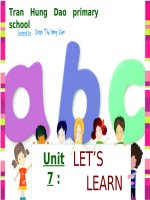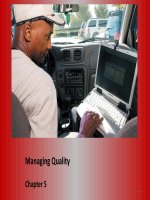Tài liệu tiếng Anh (cao học) Chapter 8 The procurement of equipment
Bạn đang xem bản rút gọn của tài liệu. Xem và tải ngay bản đầy đủ của tài liệu tại đây (570.26 KB, 25 trang )
8-1
Chapter 8
The Procurement of
Equipment
8-2
Key Concepts
•
The Nuances of Capital Equipment Procurement
»
Nonrecurring Purchases
»
Nature and Size of Expenditure
•
Building the Foundation
»
Identify the Need for a Procurement
»
Project Management
»
Selection of an Equipment Sourcing Team
»
Build and Train the Team
•
Identify Objectives and Estimate Cost
»
Identifying Objectives
»
Used Equipment
»
Spares
»
Estimating Acquisition Costs and TCO
8-3
Key Concepts
•
Develop Specifications and Initiate Sourcing,
Pricing & TCO Analysis
»
Develop Specifications
»
Sourcing
»
Develop Updated Acquisition Cost and TCO
Estimates
»
Updated Cost Estimates
»
Meet Budget and TCO Objectives
»
Top Management Approval
»
Negotiation
8-4
Key Concepts
•
Leased Equipment
»
Types of Leases
»
Factors Favoring Leasing
»
Factors Weighing Against Leasing
»
To Lease or to Buy?
•
Initiate Lease or Contract
•
Post Award Activities
8-5
The Nuances of Capital Equipment Procurement
•
Nonrecurring Purchases
•
Nature and Size of Expenditure
•
Price vs. total life cost (TCO)
•
Single-purpose vs. multi-purpose
•
New, Used, Lease?
•
Who should be involved in the process
8-6
Supply Management’s Role
•
Distinctly different
role than in
acquisition of
materials
•
Gatherer of
Information
•
Source of information
•
Process coordinator
•
Consultant to
management
•
Contract
administration
•
Facilitator of unbiased
specifications
•
Liaison service
provider
•
Negotiator
8-7
Phase I: Build the Foundation
•
Identify the Need for
a Procurement
•
Project Management
•
Selection of an
Equipment Sourcing
Team
•
Build and Train the
Team
Figure 8-1
Figure 8-1
8-8
Figure 8-2
Figure 8-2
Phase II: Identify Objectives and Estimate Costs
•
Identifying
Objectives
•
Used Equipment
•
Spares
•
Estimating
Acquisition Costs
and the Total Cost
of Ownership
8-9
Used Equipment
•
Reasons for Purchasing Used Equipment
»
Cost
»
Availability
»
Used equipment may satisfy the purchasing
need
•
The Used Equipment Market
»
Used equipment dealers
»
Sale by owner
»
Brokers
»
Auctions
8-10
Used Equipment
•
Cautions in Purchasing Used Equipment
»
Difficult to determine the true condition
»
Check the reputation of the supplier
»
Inspect the equipment
»
Observe the equipment under power
»
Determine the age
8-11
Estimating Acquisition Costs and the Total Cost of
Ownership
•
A team should develop both acquisition cost and
TCO cost estimates
•
In the development of the estimates the life cycle
costs should be considered
8-12
Life Cycle Cost Analysis
•
Usage of the
equipment
•
Number of years it will
be in service
•
Various economic
inflation factors
•
Original delivered cost
•
Installation
•
Ongoing adjustment
•
Calibration
•
Energy and labor for
operation
•
Routine maintenance
•
Major overhauls
•
Downtime
•
Disposal of the
machine
8-13
Total Cost of Ownership for Equipment
n
TCO = (A) + (NPV Σ C
i
) - NPV S
n
i = 1
A = delivered acquisition cost
NPV = net present value
C
i
= total operating costs incurred in year i
S
n
= salvage value in year n
8-14
Develop Specifications and Initiate Sourcing,
Pricing and TCO Analysis
•
Develop Specifications
•
Sourcing
•
Develop Updated Acquisition Cost and TCO
Estimates
•
Updated Cost Estimates
•
Meet Budget and TCO Objectives
•
Top Management Approval
•
Negotiation
8-15
Figure 8-3
Figure 8-3
Phase III: Develop Specifications and Initiate
Sourcing, Pricing and TCO Analysis
8-16
Develop Updated Acquisition Cost and TCO
Estimates
•
Meet Budget and TCO Objectives?
•
Top Management Approval
•
Negotiation
8-17
Develop Updated Acquisition Cost and TCO
Estimates
$2,500,000$3,000,000
$1,300,000$2,000,000PV future cost
$1,200,000$1,000,000Acquisition cost
YX
Table 8-1
Table 8-1
TCO
8-18
Figure 8-4
Figure 8-4
Phase IV: Sourcing Lease/Buy Analysis
and Post Award Activities
8-19
Leased Equipment
•
Operating Lease
»
Used by most firms to facilitate business operations
»
Focus is on operating convenience and flexibility
»
Firm is usually not interested in ownership
»
Most operating leases are short term
»
Most often used when firm wants freedom/flexibility
•
Financial Lease
»
Primary motivation is to obtain financial benefits
»
Usually they are long‑term
»
Length is usually shorter than the life of the equipment
»
Many financial leases are non-cancelable
»
Some argue financial leases distort the financial reports
8-20
Leased Equipment
•
Factors favoring
»
Operating and
Managerial
Convenience
»
Operating Flexibility
»
Obsolescence
Protection
»
Financial Leverage
»
Income Tax
Considerations
–
difference between
lease payments and
allowable depreciation
can be written off
•
Factors against
»
Cost
»
Control
8-21
To Lease or to Buy?
•
Cost Comparison
•
The Decision
»
Determine the operating advantages and
disadvantages
»
From an operating point of view, is leasing the
preferred alternative?
»
If leasing is preferable, calculate and compare
the present value costs of the two alternatives.
»
Make the decision
8-22
Initiate Lease or Contract
•
Responsibility of both parties
•
Acceptance testing and inspection
•
Acceptance timing
•
Machine specifications
•
Performance standards
•
Guarantee conditions
•
Penalties, if any
•
Length of agreement
8-23
Post-Award Activities
•
Work closely with the users of the equipment to
ensure that performance expectations are fulfilled
»
Collect and interpret performance data
»
Use techniques from the chapter on
Relationship and Contract Management where
applicable
8-24
Concluding Remarks
•
Supply management personnel function as
facilitators, coordinators, contract administrators,
and consultants in procurement of equipment
•
Specifications must be precise and complete
•
Economic analyses must be thorough and
accurate
•
Total cost of ownership analysis must be used
•
Responsibilities of both the supplying and buying
firms should be established
8-25
END









